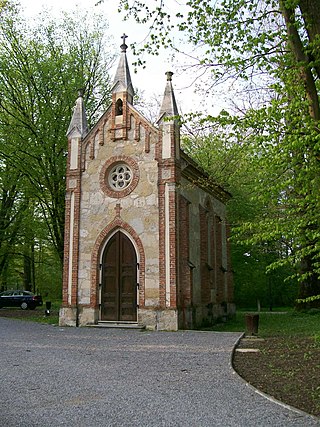
Zaprešić is a town in Hrvatsko zagorje, Zagreb County in Croatia. It has a population of 19,644 inhabitants in the town proper, with 25,223 in the administrative area. The town's metropolitan area, which encompasses the seven neighbouring municipalities, has a population of 54,640. Zaprešić is the third-largest, and most densely populated town of the county. It is located northwest of the Croatian capital Zagreb, and near the Slovenian border. It is centered on plains north of the Sava River, and is bordered by Medvednica Mountain to the east, and the Marija Gorica Hills to the west.

Croatia recognizes life partnerships for same-sex couples through the Life Partnership Act, making same-sex couples equal to married couples in almost all of its aspects. The Act also recognizes and defines unregistered same-sex relationships as informal life partners, thus making them equal to registered life partnerships after they have been cohabiting for a minimum of 3 years. Croatia first recognized same-sex couples in 2003 through a law on unregistered same-sex unions, which was later replaced by the Life Partnership Act. The Croatian Parliament passed the new law on 15 July 2014, taking effect in two stages. Following a 2013 referendum, the Constitution of Croatia has limited marriage to opposite-sex couples.

Tatjana Cameron, known professionally as Tajči, is a Croatian singer, television show host, published author and blogger, who now lives in the United States.
Darko Ronald Suvin is a Canadian academic, writer and critic who became a professor at McGill University in Montreal. He was born in Zagreb, which at the time was in Kingdom of Yugoslavia, now the capital of Croatia. After teaching at the Department for Comparative Literature at the Zagreb University, and writing his first books and poems in his native language, he left Yugoslavia in 1967, and started teaching at McGill University in 1968.

Mate Maras is a Croatian translator. He has translated many famous classical and contemporary works from English, Italian and French into Croatian. He is the only man who translated the complete works of William Shakespeare into Croatian. His translation of Rabelais' Gargantua and Pantagruel earned him the grand prix of the French Academy. He wrote the first Croatian rhyming dictionary.

Vladimir "Vlada" Divljan, was a Serbian singer and songwriter. He was known as the frontman of the Serbian and Yugoslav rock band Idoli, one of the bands which initiated the Yugoslav new wave on the music and cultural scene of Yugoslavia in the 1980s, as well as for his solo works.

Goblini are a Serbian punk rock band from Šabac.

U Škripcu was a Yugoslav rock band formed in Belgrade in 1980.
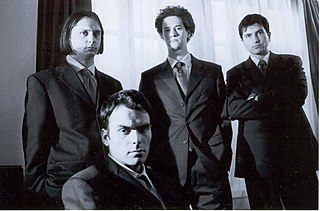
Presing is a Serbian alternative rock band from Belgrade. Formed in 1990 and named after pressure defense in basketball, Presing were, together with Darkwood Dub and Kanda, Kodža i Nebojša, representatives of the so-called NeoBeo sound, alternative, guitar-based rock music produced in Belgrade in the early 1990s. New York Press wrote about Presing: "It's a sound that kicks the pants off the recycle-rock of The Strokes, The Vines and the White Stripes, just to name a few... You can hear bits of the melodic era of The Fall, some Nick Cave, some Neil Young–and even some P-Funk via Kraftwerk".
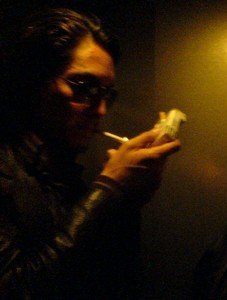
Yves-Alexandre Tripković is a French writer, stage director and translator.
SFera is a science fiction society from Zagreb, Croatia. It was founded in 1976, thus marking the beginnings of organised science fiction fandom in the region.
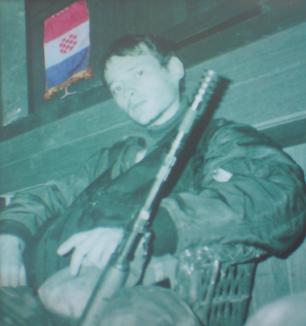
Jean-Michel Nicollier was a French volunteer and Croatian soldier in the Croatian War of Independence who was killed in the Vukovar massacre.
Rockovnik is a forty-episode documentary aired on Radio Television of Serbia in 2011, written by Sandra Rančić and Dušan Vesić and directed by Vesić. The series focuses on the history of former Yugoslav rock scene from its beginnings in the late 1950s until the year 2000. The name of the show is a bilingual pun based on the words "rock" and "rokovnik".

Damir Hoyka is a Croatian fine art and advertising photographer. The focus of his work are portraits and creative personal projects, and lately his educational project Fotosofia where he shares his knowledge and experience with photography talents. He has won several awards.
Loudworks is a Serbian dubbing studio of animated and live-action content.

Irena Lukšić was a Croatian writer, translator, scholar and editor. She was born in a middle-class family, her mother Zora was en economist, and her father Zdenko an administrative lawyer. In her town of birth she completed her primary and secondary education, and she graduated in Comparative Literature and Russian Language from the Faculty of Philosophy at Zagreb University. She also studied journalism at the Faculty of Political Sciences in Zagreb She obtained her doctoral degree with a thesis on Russian emigrants' literature. Her first critical reviews were published in the mid-1970s, in a music magazine. At the time she started collaborating as translator with a number of editions of Vjesnik newspaper. Short stories published in various magazines in the late 1970s marked her literary debut. The year 1981 saw the publication of her first novel Hostel for Train-escorting Personnel, which the literary critics immediately included in the category of so-called prose in jeans, i.e. youthful rebellion against authority and social restrictions. The novel Seeking a Spoon and the collection of short stories Seven Stories or One Life may be said to belong to a similar stylistic formation, while the short-story collection Nights in White Satin (1995) is characterized by a postmodernist view on reality as a game in language. The novel Return of the Broken Arrow (2000), dealing with the war in Croatia, indicates a turn towards reality. Accordingly, the novel Celestial Cyclists (2008) is set in the 1960s and interspersed with documentary material from the sphere of pop-culture, and the book of travel prose Desperately Foreboding Cohen (2013) is based on cultural references important to the 20th century and the literary procédé typical of the adventure genre.
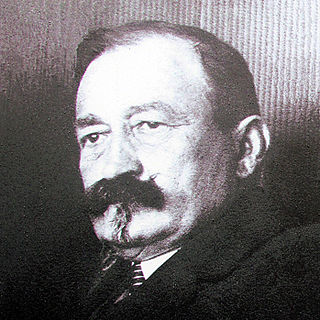
Milorad Pavlović — Krpa was a Serbian writer, publicist, translator, and editor and publisher of Glasnik za zabavu i nauku.
Yugoslav science fiction comprises literary works, films, comic books and other works of art in the science fiction genre created in Yugoslavia during its existence (1918–1991).

Adrijan Sarajlija is a Serbian writer, physician and medical scientist. He is known in region of former Yugoslavia for his short speculative fiction stories and his SF novel AMirror for the Vampire /Ogledalo za vampira/. He completed the First Belgrade High School and graduated from the Faculty of Medicine in Belgrade.














